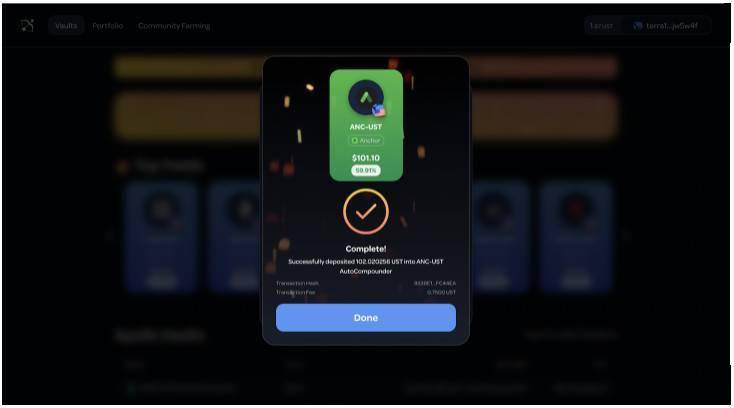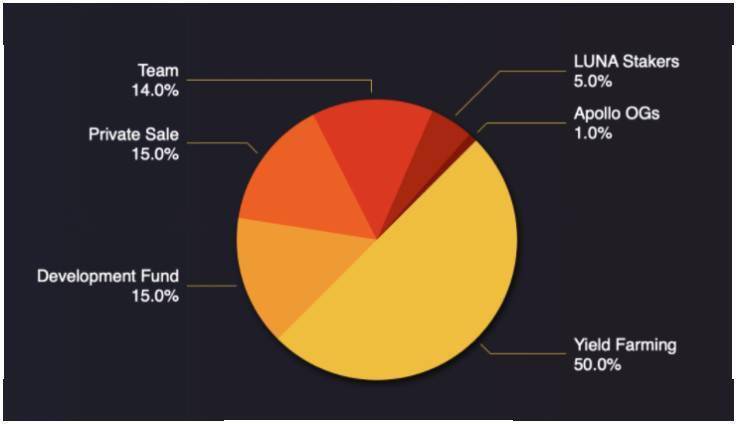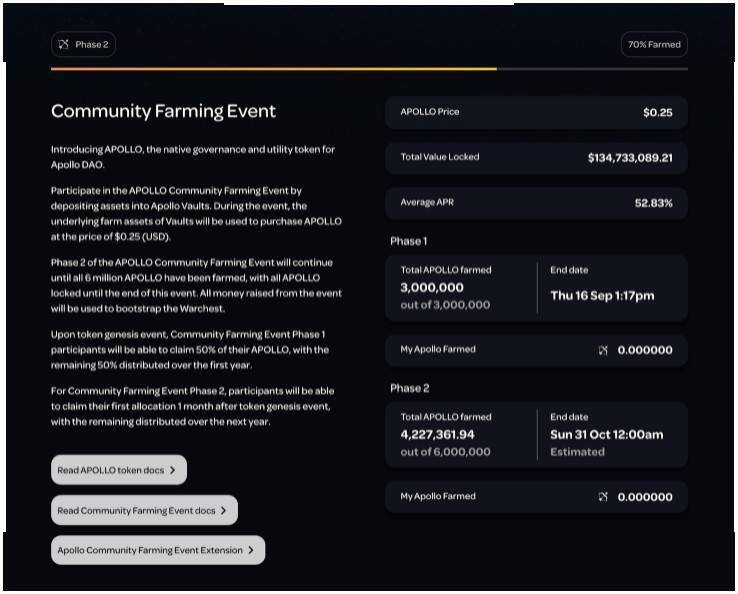Pantera Capital Partner: Understanding the Terra Ecosystem Composite Yield Protocol Apollo DAO
Original authors: Paul Veradittakit, Partner at Pantera Capital
Compiled by: Lu Jiangfei, Chain News
Last month, the well-known crypto venture capital firm Pantera Capital announced that it has become the first investor in Apollo DAO, a new compound yield DeFi protocol on the Terra blockchain. We are excited to provide the necessary funding and guidance for this project alongside other strategic investors such as Do Kwon and GSR, helping Apollo DAO reach new heights.
In recent months, the DeFi ecosystem on the Terra blockchain has developed rapidly. For example, the high-yield savings product protocol Anchor Protocol, launched in April this year, now has a total locked value exceeding $5 billion; the synthetic stock protocol Mirror has a locked value of over $1.5 billion; and the fully diluted market cap of the Terra ecosystem reserve asset LUNA has surpassed $40 billion.
While Ethereum remains the center of DeFi activity, the developers and astonishing value growth within the Terra ecosystem have proven that the Terra blockchain is also a successful and resilient Layer 1, even if it seems somewhat coincidental.
What is Apollo DAO?
Apollo DAO aims to "bring DeFi to the masses," and its first product aligns perfectly with this mission: an automatic yield synthesizer based on the Terra blockchain designed to make it easier for people to participate in DeFi.
Why can automatic compounding bring value to investors? To understand this, we might start with an example. Let's assume you are a liquidity provider for the Mirror protocol. If you provide funds to the liquidity pool (say in the form of mTSLA), you can earn LP rewards in the form of the Mirror protocol's native token, MIR; however, if you don't want the MIR tokens and instead want more mTSLA to reinvest in the liquidity pool, you would have to manually swap MIR for mTSLA, during which you might encounter slippage, high gas fees, and transaction congestion.
Imagine if you executed the above transaction multiple times across several different liquidity pools; unless you are an institutional LP or a DeFi whale, you either lack sufficient bandwidth or patience, or you don't have enough capital to support it—this is precisely where Apollo DAO's automatic synthesis product can play a role.
Users can easily view different yield opportunities directly from Apollo DAO's front end and choose to invest in various liquidity pools. By default, these liquidity pools can automatically reinvest yield rewards, thereby reducing the high network fees and other hassles caused by manual transactions.
The Apollo DAO protocol has also fully considered user-friendliness in its interface design; few DeFi protocols are as powerful and intuitive as Apollo DAO (even rarer in the Terra ecosystem), and the protocol is even compatible with mobile devices.

Last month, the Apollo DAO protocol was officially launched, attracting $200 million in locked value within just 24 hours, undoubtedly indicating strong interest from the crypto community. As of now, the locked value of the Apollo DAO protocol ranks seventh in the entire Terra ecosystem.
Does Apollo DAO have a native token?
APOLLO is the native token of the Apollo DAO protocol.
Currently, the APOLLO token has two key uses:
- APOLLO token holders can gain voting rights on DAO governance decisions, such as adding new vaults, changing performance fees, and other protocol parameters;
- Users can stake their APOLLO tokens to earn rewards (in the form of zAPOLLO);
Additionally, early vault depositors have brought critical liquidity to the Apollo DAO protocol, so they may receive token allocation rewards.

Although the APOLLO token has not been fully released, community distribution has already begun. In the first Community Farming Event, the protocol launched 3 million APOLLO tokens, which were oversubscribed, prompting the team to decide to issue an additional 6 million APOLLO tokens for yield farming participants. If you are interested in participating, you can learn more information here.

What is Apollo DAO's "War Chest"?
The "War Chest" is the most core element of the Apollo DAO protocol and an important distinction from other DeFi protocols.
In short, the "War Chest" is a liquidity pool for the Apollo DAO protocol's fees, which grows in scale in sync with the protocol's usage. By default, Apollo DAO's "performance fee rate" is 20%, but token holders can change the rate; the vast majority of the fees (99%) earned by the protocol will be directly allocated to the "War Chest"—the remaining 1% will be donated to charity through the Angel Protocol.
Once funds enter the "War Chest," token holders can vote on the allocation of funds, with the default allocation ratio as follows:
- UST: 50%
- bETH: 20%
- aUST: 30%
However, DAO governors can also use these funds as they see fit, such as engaging in high-yield liquidity mining activities, purchasing different crypto assets, or even repurchasing APOLLO tokens.
In the future, the "War Chest" will also participate in the "meta-governance" of the Terra ecosystem. Since the fund primarily holds assets on the Terra chain, Apollo DAO may ultimately become an important stakeholder and participant in governance decisions, similar to institutional funds, as its development team stated:
"The APOLLO token allows holders to gain voting rights and decide how to use the DAO, thus achieving meta-governance. The Apollo protocol will also strategically use this voting power to help shape a better Terra ecosystem before expanding to other ecosystems. Thanks to this voting power, if other protocols want to explore the Terra blockchain, Apollo DAO can become their best partner."
At this stage, the locked value in the "War Chest" has exceeded $2 million.
Future Development Directions
While Apollo DAO's flagship product is an automated compounding tool, the team has even more ambitious plans for future development.
For example, they plan to expand to support DeFi protocol vaults on other non-Terra blockchains, which may incorporate more complex cross-chain strategies. Of course, such development plans align with Apollo DAO's mission to broaden the reach of DeFi and make it more user-friendly with less friction.
But what is Apollo DAO's ultimate vision? In their own words:
"Apollo DAO's long-term vision is to create something akin to a decentralized hedge fund; in the initial phase, we will focus on assets on the Terra chain, but we expect to invest in other blockchains soon. The War Chest consists of staked LUNA and aUST, and APOLLO token holders have the right to decide which Terra chain yield farming opportunities to deploy these funds into, as well as how to handle the rewards."
Undoubtedly, the vision of becoming a decentralized hedge fund is what excites me most about the Apollo DAO project.
In fact, we have already seen some excellent teams exploring the concept of "decentralized investment funds," such as BitDAO and Yield Guild Games; now Apollo DAO (and its token holders) is also beginning to try, and I hope they can achieve success.










